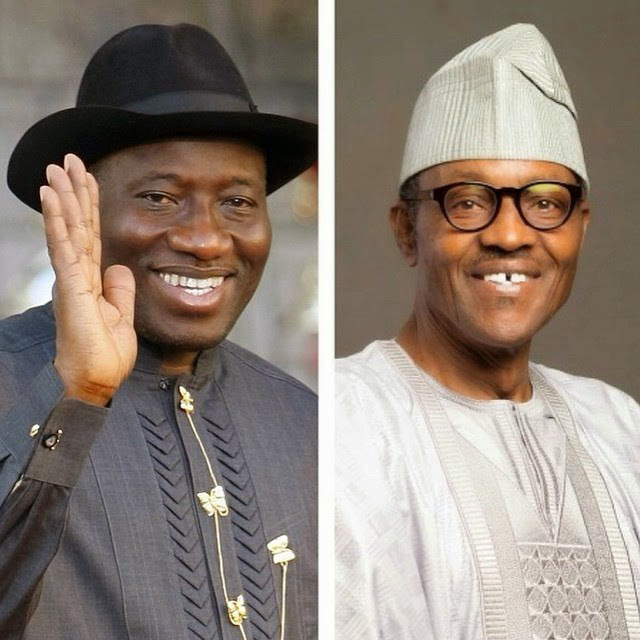Nigerian opposition leader Muhammadu Buhari held a lead of more than two million votes Tuesday in the country’s general election, but with President Goodluck Jonathan’s strongholds yet to report, the final result was too close to call.
Just over half of Nigeria’s states have declared returns in the vote pitting Jonathan against former military ruler Buhari in the closest election ever in Nigeria, Africa’s most populous country and biggest economy.
Buhari is making his fourth run at the presidency. His prospects this time have been buoyed by frustration over endemic corruption, criticism over Jonathan’s handling of Boko Haram’s six-year Islamist uprising and a better organised opposition.
Buhari built his early lead in northern states dominated by the mainly Muslim, Hausa-Fulani ethnic group of which he is a member.
Jonathan is however expected to run up huge margins in his home area, the southern, oil-producing Niger Delta, which could offset his losses in the north.
So far, Buhari and his All Progressives Congress (APC) has won 10 states, with Jonathan, of the Peoples Democratic Party (PDP) taking eight plus the Federal Capital Territory of Abuja.
Results from the rest of the country were expected from 10:00 am (0900 GMT), with a winner expected to be declared by the end of the day.
– Ruling party ‘unperturbed’ –
The PDP, which has controlled the presidency since the end of military rule in 1999, said the early returns were no cause for concern.
“The(PDP) is unperturbed by the results of the elections so far,” spokesman Olisa Metuh said in a statement.
“The results from (PDP) strongholds will overwhelm those from the (north) and give it a clean and clear victory at the end of the day,” he added.
But Buhari may be encouraged by tallies from two northern states, where he stretched his lead over Jonathan compared to four years ago.
In Kano, the 72-year-old defeated Jonathan by nearly 1.7 million votes after besting the president by roughly one million in 2011.
And in Kaduna, where the two ran neck-and-neck in 2011, Buhari won by 650,000 votes.
Heavily populated Rivers state in the Niger Delta and the economic capital Lagos are among the key areas yet to declare.
International observers gave broadly positive reactions to the conduct of the vote, despite late delivery of election materials and technical glitches with new voter authentication devices.
Nigeria’s Transition Monitoring Group, which had observers across the country, said: “These issues did not systematically disadvantage any candidate or party.”
– US, UK warning –
The PDP and the APC on Sunday traded allegations of vote rigging and other irregularities, raising the possibility of a legal challenge to the results.
Violence has often flared in previous Nigerian votes after the winner is announced and the United States and Britain warned against any “interference” with the count.
“So far, we have seen no evidence of systemic manipulation of the process,” US Secretary of State John Kerry and British foreign minister Philip Hammond said in a joint statement.
“But there are disturbing indications that the collation process — where the votes are finally counted — may be subject to deliberate political interference.”
Kayode Idowu, spokesman for the Independent National Electoral Commission (INEC), told AFP that there was “no evidence of political interference”.
– Fears, curfew –
Kaduna, one of the areas worst-affected by violence four years ago when some 1,000 people were killed in post-election clashes, was said to be calm.
Awwal Abdullahi Aliyu, president of the Northern People Unity and Reconciliation Union, warned that places such as Kaduna remained a powderkeg and could “catch fire”, particularly if electoral fraud is suspected in any ruling party victory.
Some 2,000 women protesting against the conduct of the elections were teargassed as they tried to converge on the local electoral commission offices in the southern oil city of Port Harcourt.
The protest over alleged vote rigging by the PDP — and a counter-protest demanding the results hold — forced the Rivers state government to impose an overnight curfew.
The winning presidential candidate needs not just the most votes but at least 25 percent support in two-thirds of Nigeria’s 36 states and the Federal Capital Territory to avoid a run-off.
Voting was pushed into an unscheduled second day Sunday after failures in controversial new technology designed to read biometric identity cards to combat electoral fraud.
Among those affected by the technical hitches was the president himself.







